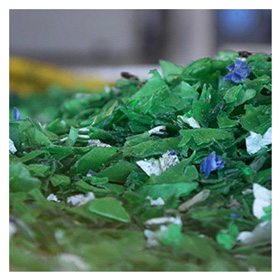From ground to good: company transforms plastics into fabric
In the wake of the Haiti earthquake in 2010, Ian Rosenberger founded Thread. By creating dignified jobs and high performance fabrics, the for-profit company is on a mission to end poverty. Thread transforms plastic bottles from the streets of Haiti and Honduras into fabrics used by global brands such as Timberland.
Haiti’s infrastructure cannot yet support rubbish collection, and in a video published by the BBC Rosenberger stated that: “Waste is buried or burned, in many cases it just floats out to sea.” It takes six steps to create Thread’s products, and each stage provides job opportunities for the local community.
The first step is on the ground: people in Haiti and Honduras collect bottles from the streets, their neighbours, and even the landfill to trade for cash at a local plastic collection centre.
The bottles are then transported to a recycling facility for processing, where any labels and lids are removed to ensure a high quality fabric.
 The third stage involves workers grinding the bottles to make plastic flakes. The confetti-like flakes then go through certain washing machines which results in superior flakes which can be melted down.
The third stage involves workers grinding the bottles to make plastic flakes. The confetti-like flakes then go through certain washing machines which results in superior flakes which can be melted down.
In the fourth step, the flakes are melted down into thread filament which is subsequently turned into fibre. This fibre is then spun to make a very thin yarn.
The fifth stage consists of weaving or knitting the yarn in Charleston, South Carolina, to create fabrics and textures. This year, Thread will have more than 35 fabrics available. By mixing the yarn with cotton, canvas or rubber, a range of clothes, shoes and bags can be made.
The sixth and final stage is that of selling the products. Thread partners with brands and designers who share its values and currently has connections which include Timberland and Ape & Bird.
Since its inception, Thread has recycled 29 million bottles which is equivalent to 840,364kg (1,852,687lbs) of plastic waste exported from Haiti and Honduras. In addition, the enterprise has generated 3,845 income opportunities and saved 1,473 litres (389 gallons) of water. Compared to producing a cotton t-shirt, the process boasts a 50% reduction in water.
It is clear that Thread makes a big impact on locals. On its website, Nancy Fanord, Centre Owner, Les Cayes, Haiti, said: “This business is all I have […] I want to be remembered as a woman who worked hard to take care of her daughter.”

On paper, this company’s business plan seems fool proof. However, it isn’t all plain sailing – or should I say sewing... Plastic is made from oil products, therefore its price depends on the price of oil. As the latter falls it becomes more financially viable for companies to make new plastic products rather than recycling waste.
Rosenberger isn’t afraid, however. In the BBC video, he explained that his decision to make Thread a for-profit company was deliberate. He believes that: “the solutions to some of the largest problems in the world are going to come through business.” Therefore the more recycled material companies buy, the more rubbish will be picked up.


